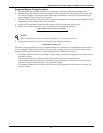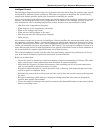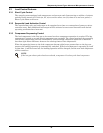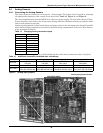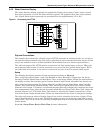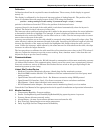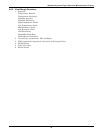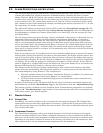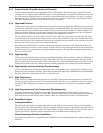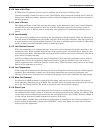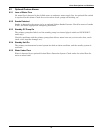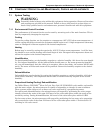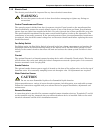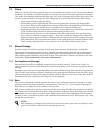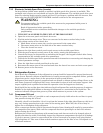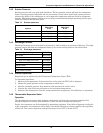
Alarm Descriptions and Solutions
45
6.1.3 Custom Alarms (Only With Advanced Controls)
Custom alarm messages are programmed at the LCD display. The alarms may be specified by the
customer at the time of order. Additional devices and wiring may be required at the factory or by oth-
ers. The message displayed may be included in this alphabetical list of alarms, or it may be custom-
ized text (for up to 2 alarms). If customized text is used, customer maintenance personnel should be
informed of the alarm function and corrective action required.
6.1.4 High Head Pressure
Compressor head pressure is monitored with a pressure-sensing switch. One SPDT pressure switch is
used for the compressor in the unit. If head pressure exceeds 360 PSIG, the switch turns off the com-
pressor contactor and sends an input signal to the control. When the condition is acknowledged, the
alarm is silenced. However, the pressure switch in the compressor compartment of the unit must be
manually reset to clear the alarm, which will allow the compressor to start.
On air cooled systems, check for power shut off to the condenser, condenser fans not working, defec-
tive head pressure control valves, closed service valves, dirty condenser coils, and crimped lines. Also,
make sure that when the compressor contactor is energized the side switch on the contactor closes to
energize the control circuit on the air cooled condenser.
On water/glycol/GLYCOOL™ systems, check water regulating valves. Verify water/glycol flow (are
pumps operating and service valves open?). Is water tower or drycooler operating? Is the coolant tem-
perature entering the condenser at or below design conditions? Is relay R5 operating during cooling to
turn on the drycooler?
6.1.5 High Humidity
If the return air humidity has increased to the High Humidity Alarm setpoint, check the following: Is
the unit setup for dehumidification (check DIP switch)? Check for proper setpoints. Does the room
have a vapor barrier to seal it from outdoor humidity? Are doors or windows open to outside air? Run
diagnostics to make sure the cooling system is working properly (the cooling system dehumidifies).
6.1.6 High Humidity and Low Humidity (Simultaneously)
If these two alarms are displayed at the same time, the humidity input signal is lost. Dashes will be
displayed for the humidity reading. The control system will deactivate humidification and dehumidi-
fication. Check for a disconnected cable or a failed sensor.
6.1.7 High Temperature
If the return air temperature has increased to the High Temperature Alarm setpoint, check the fol-
lowing: Are the setpoints correct? Is the room load more than the unit can handle (is the unit capacity
too small)? Run diagnostics to make sure all cooling components are operating (compressor and/or
valves).
6.1.8 High Temperature and Low Temperature (Simultaneously)
If these two alarms are displayed at the same time, the temperature input signal is lost (or the
humidity is out of sensor range: 15 to 85% RH). Dashes will be displayed for the temperature reading.
The control system will initiate 100% cooling. Check for a disconnected cable or a failed sensor.
6.1.9 Humidifier Problem
Infrared Humidifiers
This alarm is activated by the high water float switch (AM and AG controls only) in the humidifier
pan assembly. The high water float switch is normally closed and opens upon alarm condition. Check
for a drain clog and, if present, clean the drain. Check for float switch stuck in the on position, free or
replace the switch. Check for proper operation of the humidifier water makeup valve.
Steam Generating (Canister) Humidifiers
This alarm is activated by a signal from the humidifier control indicating that the canister needs to be
replaced.



